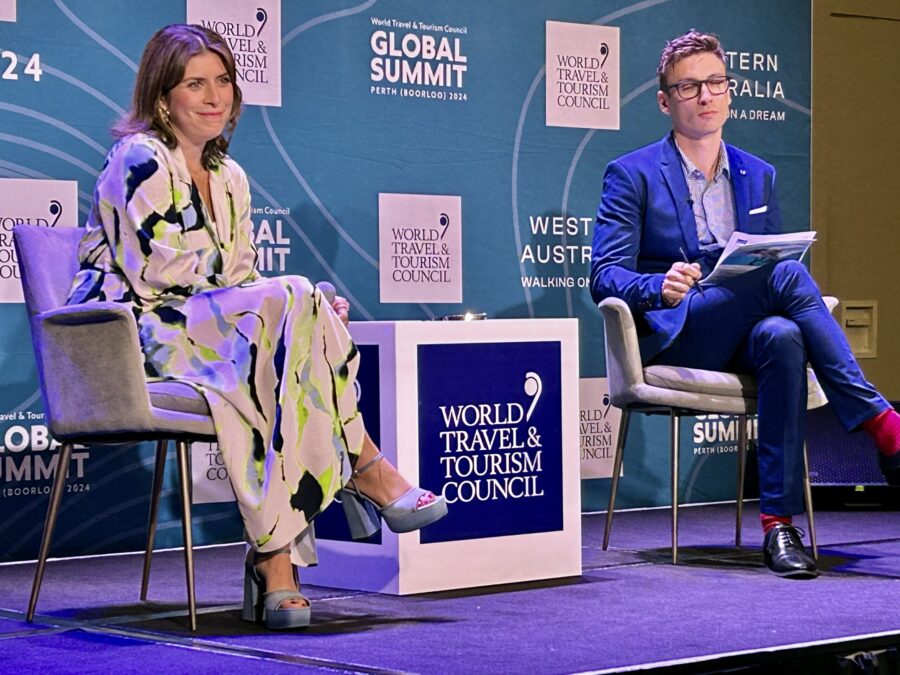A new report by the World Travel & Tourism Council reveals that Oceania’s travel and tourism sector could inject an additional US$112BN (AU$166.4) to the region’s economy by 2034, bringing the total contribution to a record-breaking US$336BN.
According to the report, in collaboration with VFS Global and launched today at WTTC’s 24th Global Summit in Perth (Boorloo), Western Australia, this boost could also support an extra 1.1 million jobs, raising the total employment in the region supported by Travel & Tourism to 3.5 million by 2034.
The report, ‘Unlocking Opportunities for Travel & Tourism Growth in Oceania’, outlines the transformative potential of the region’s sector if strategic investments are made.
But while the overall sector has recovered, domestic tourism has played an important role, “but international visitors perhaps have not come back at the same pace as domestic”, said WTTC senior vice president, Virginia Messina.
According to WTTC, Oceania, a region which includes Australasia, Melanesia, Micronesia and Polynesia, could become a global leader in sustainable travel, while significantly boosting its economy.
“We wanted to look at Oceania, and this region of more than 10,000 islands spread across the Pacific Ocean. Obviously, we all know Australia, New Zealand, Papua, New Guinea, there’s so many that we’ve heard of, but there are other smaller islands are part of this region, like Tonga, Samoa, Palau, so many others that, of course, are very important for our sector, but where the theme and the topic of sustainability and climate change becomes a real priority,” she said.
However, unlocking this economic and social boost requires targeted action in a number of key areas.
These include:
• Investing in sustainable infrastructure to mitigate and adapt to the impacts of climate change
and enhancing connectivity across the region;
• Enhancing air connectivity;
• Streamlining visa processes;
• Promoting eco-friendly tourism practices that protect Indigenous communities.
For this growth to be realised, the report also advocates for a comprehensive policy package to include expanding airports across the region and developing renewable energy sources for tourism infrastructure.
Streamlining visa facilitation is also critical to unlocking this potential growth and would allow for a more seamless travel experience between Pacific islands.
VFS Global, a world leader in innovative visa solutions, is well-positioned to support these efforts by enabling more efficient visa processes, which could drive increased multi-country travel across the region.
Julia Simpson, WTTC President & CEO, said: “Oceania has an unparalleled opportunity to grow its Travel & Tourism sector in a way that not only drives economic growth but sets the standard for sustainability.
“By investing in climate-resilient infrastructure and supporting Indigenous communities, the region could become a global leader in eco-conscious, inclusive tourism.”
Zubin Karkaria, founder and CEO, VFS Global Group, said: “We are delighted and honoured to collaborate with WTTC on this comprehensive report that highlights the immense potential of the travel and tourism industry in Oceania.
“As the world’s leading outsourcing and technology service specialist, VFS Global works with 69 governments worldwide with a presence in over 150 countries. Since establishing our presence in the Oceania region in 2008, we are now the trusted partner of 26 governments, serving 15 cities across eight countries in the region.
“VFS Global is committed to playing a pivotal role in harnessing the region’s potential, along with upskilling the workforce, a crucial component in the tourism sector. Together, we aim to unlock new opportunities and support long-term resilience and success of the sector.”
Sustainability is central to the region’s long-term success.
The report highlights the need for eco-friendly infrastructure, including renewable energy solutions for resorts and climate-adaptive projects, which will not only reduce the sector’s environmental footprint, but also attract the growing market of environmentally conscious travellers.
Indigenous-led tourism is also critical in this transition, providing authentic cultural experiences while ensuring local communities benefit directly from tourism revenue.
Also giving island nations access to affordable sustainable aviation fuels (SAF) will be key in future plans, Messina said.
“We are working as an industry with other partners, such as IATA, such as all the airlines, of course, and energy companies to really and but also governments to see how we can scale the production of SAF,” Messina said.
A look at 2024
By the end of this year, Travel & Tourism in Oceania is forecast to grow by 16.5 per cent above pre-pandemic levels to reach US$224 billion, and employment supported by the sector is expected to exceed pre-pandemic figures by 4.8 per cent, employing 2.3 million people.
However, international visitor spending is projected to remain 4 per cent below 2019 levels, with a full recovery not expected until 2025.
Feature image: WTTC VP Virginia Messina and Nejc Jus, WTTC director of research reveal the Oceania report at the Global Summit.
Source link : https://travelweekly.com.au/article/733914/
Author :
Publish date : 2024-10-09 03:26:28
Copyright for syndicated content belongs to the linked Source.
